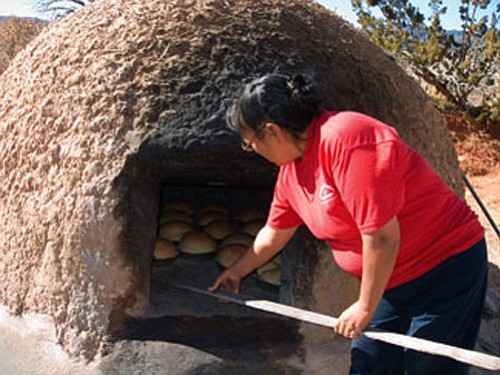What will they think of next?
The other morning, I was reading a letter to the editor from a small paper in northern New Mexico that was forwarded to me by a colleague of mine from New Mexico and was completely taken aback by the matter being discussed.
Before I start ranting and raving, let me set the stage here, so to speak... As everyone may be aware, bread is a staple for just about any meal, whether it's a fancy-shmancy seven course meal at a five-star restaurant, or just a quick piece of toast for breakfast or a peanut butter and jelly sandwich for lunch. Long story short, people love their bread!
Here in the southwest, traditional bread made by Native Americans is as coveted as a bar of solid gold. It's no secret that people from this region will travel long distances to buy Native-baked bread, and at times, you will see a car or two parked by the roadside somewhere with neatly packaged loaves of freshly baked bread displayed on the hood of the car or Native vendors selling their bread at local swap meets and farmers markets.
"So what's wrong with that?" you might ask. The New Mexico Environment Department may have your answer. Just last week, an inspector with the NMED found a problem with some bread and cinnamon-flavored Indian cookies being sold by a Santo Domingo family at the Espanola Farmer's Market, telling the manager of the farmer's market that the sale of such bread is now deemed as an illegal activity in New Mexico. So why is it illegal to sell Native American bread and cookies at the Espanola Farmers Market?
Apparently, a senior NMED official told the manager of the farmer's market that, "It's as if they are bringing food in from a foreign country."
The manager argued that the three generations of ladies who prepare the bread each had a food safety certificate issued by the Indian Health Service, a federal agency, but the NMED official insisted, "We are the agency responsible for regulating food safety," stating that as a state agency, they couldn't go onto tribal lands to inspect tribal kitchens.
The farmer's market manager then pointed out that the bread isn't prepared in kitchens, per se, but that they were baked in traditional mud-plastered ovens called hornos (introduced to Pueblo tribes by the Spanish in the late 1500s) to which the NMED official replied, "The bread must be prepared in a certified kitchen."
I imagine that the farmer's market manager must have been exasperated at this point, explaining to the NMED official, "Then it's not horno bread."
So who's right? If you ask me, there's absolutely nothing wrong with traditional Native bread that's been prepared in the traditional way and baked in a traditional horno much like our ancestors did many, many centuries ago. As a self-proclaimed "rez boy," I wholeheartedly cherish this facet of my culture and heritage and wouldn't trade it for anything else!
Now don't get me wrong, I'm all for food safety, but isn't this going a little bit overboard? Just because this particular type of bread isn't baked in shiny pans in gleaming silver ovens by bakers in sterile white outfits, does that make it any more of a food safety threat than store-bought bread, some of which use a combination of artificial colors, flavors and ridiculously unpronounceable chemical preservatives?
If there was something really wrong with our "tried and true" method of baking bread, then why are most (if not all) Native tribes in both New Mexico and Arizona still baking bread in much the same way they did over 400 years ago?
The NMED should remember the old adage: "You can't have your cinnamon-flavored Indian cookies and eat them too."
SUBMIT FEEDBACK
Click Below to:




